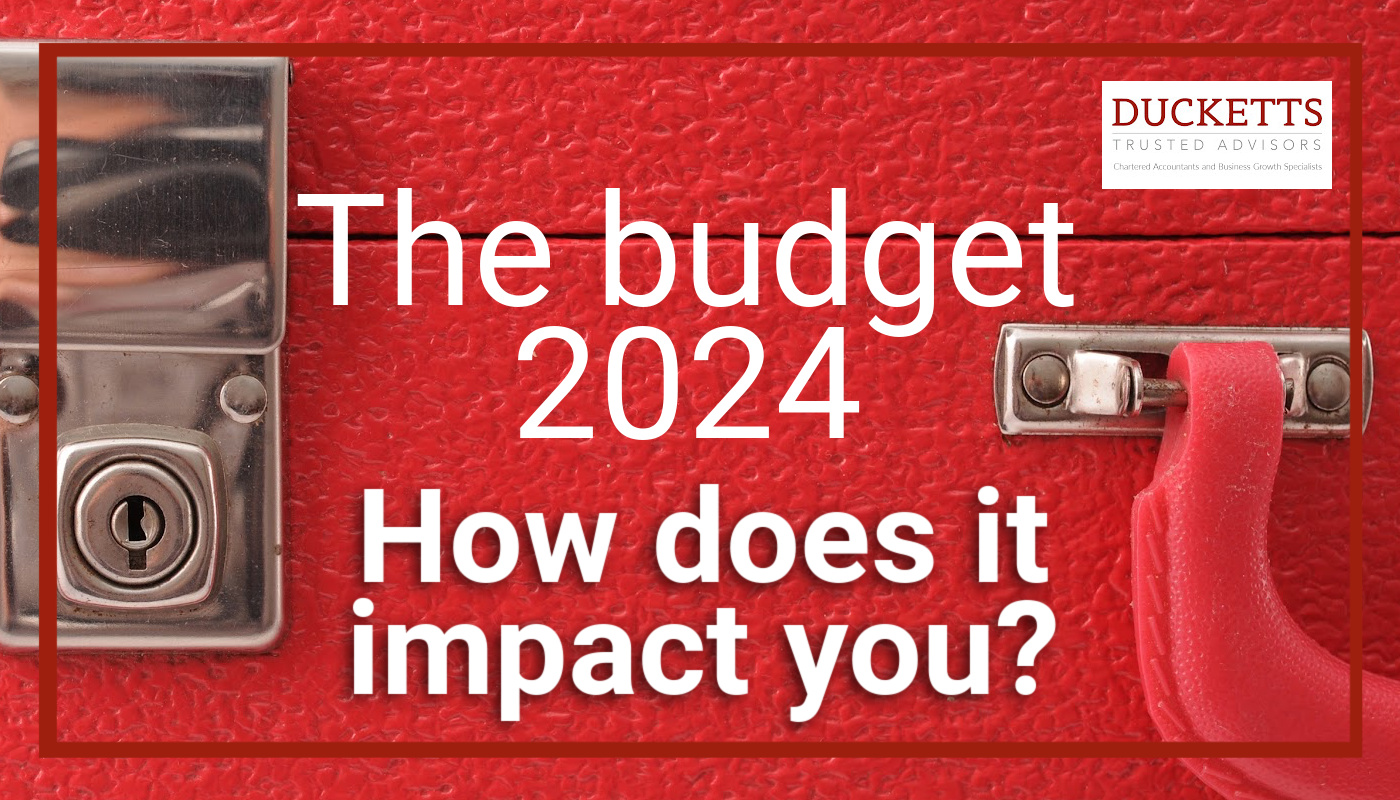The Budget 2024
Published:

Well, it wasn’t a great budget for businesses, but it could have been a lot worse.....
I’m sure many more details will come out over the next few weeks or months, but here are some of the headlines we know now. There is a lot to cover therefore not all the details are included.
Employer costs
Minimum Wage to increase:
- The minimum wage for over 21s, known officially as the National Living Wage, will rise by 6.7%, from £11.44 to £12.21 from April 2025.
- For 18 to 20-year-olds, the minimum wage will rise from £8.60 to £10.
- For apprentices and 16–17-year-olds they will get the biggest pay rise, from £6.40 to £7.55 an hour.
Employers NI to increase to 15% from 6 April 2025 and employers will start paying it when employees earn over £5k (previously £9,100).
The good news is that Employment allowance is increasing from £5,000 to £10,500. There was also an announcement that the large employer’s restriction will be removed therefore businesses who have Employers NI bills of over £100,000 will now be eligible to claim the Employment allowance. These changes come into effect from 5th April 2025.
This change to Employers NiI rates also means that the Employers NiI payable on benefits in kind will increase.
Capital Gains tax
Capital gains tax will increase from 10% to 18% for basic rate tax payers and 20% to 24% for higher rate tax payers, this is being implemented immediately, which isn’t great news for anyone who didn't manage to get a deal over the line on 30th October and seems a little unfair.
The good news is capital gains tax on the sale of residential property isn’t changing and staying at 18% for basic rate tax payers or 24% for higher rate tax payers.
Capital gains tax which is subject to Business asset disposal relief will increase from 10% to 14% for disposals after 6 th April 2025 and increase further to 18% for disposals after 6 th April 2026. The £1m lifetime limit is still in place for now.
Vehicles - Benefit in Kind and capital allowances
Something which hasn’t been talked about as much in the news is double cab pick-ups (with payloads of over 1 Tonne) these will be treated as cars for benefit in kind and capital allowance purposes from April 2025, although transitional arrangements for benefits on kind will apply until April 2029. This was originally announced by the previous government but was swiftly met with a U-turn, (funny that Rishi was talking at the NFU conference that week). No mention of changes to VAT on these yet.
Therefore, if you are thinking of buying a double cab pick-up in your company, please do it before April 2025 or you’ll be hit with a large benefit in kind, also make sure the payload is more than 1 Tonne. Anything with a payload of less than 1 Tonne was already treated as a car. If you already own one in the company, then no need to do anything until April 2029. There are obtuse rules around when the contract is signed, and how the payload is calculated so please contact us if you need to discuss this further.
This change also means that for any double cab pick-ups purchased after April 2025, annual investment allowance cannot be claimed and instead you will get a 6% annual writing down allowance.
The van BIK figure for 25/26 will be £4,020, with the fuel BIK on a van being £769.
Benefit in kind percentages for company cars which are based on the emissions have been updated for the tax years 28/29 and 29/30.
The 100% FYA allowance on zero emission cars has been extended until 31st March 2026 for Corporation tax and 5th April 2026 for partnerships and sole traders.
Other benefit in kind changes
From April 2025 the Official rate of interest which is used to calculate the Benefit in Kind for Employment-related loans and living accommodation will be updated quarterly (previously this was an annual change). The main effect of this will be to clients who have overdrawn directors loan accounts of over £10k per person.
As mentioned previously the class 1A national insurance payable by the company will now be at 15% of any benefit in kind for the tax year 25/26
Stamp Duty
The stamp duty surcharge on second homes is going to increase from 3% to 5% from 31st October 2024. They have are also decided not to extend the temporary reduction in reducing the stamp duty thresholds for people buying their first home so these will go back down from £425k to £300k in April, along with the thresholds for stamp duty on a main home from £250k to £125k.
For companies buying residential property over £500k the stamp duty will also increase from 15% to 17%.
Corporation tax
The government have pledged no changes to corporation tax rates and allowances until the end of parliament. Therefore, no changes to AIA (£1m allowance remains), full expensing or rates of R&D tax reliefs.
Inheritance tax
The government are setting a limit on Agricultural property relief and Business tax relief of £1m for full relief. Anything over the £1m you get 50% tax relief, so rather than paying 40% IHT (the full rate) you pay 20%. The £1m limit is for both Agricultural property relief (APR) and Business property relief (BPR) combined, you can’t get it twice. These come into effect from 6th April 2026.
For any lifetime gifts which are potentially exempt transfers for inheritance tax purposes which are given on or after 30th October 2024, and where the donor dies within 7 years and after 6th April 2026 they will also fall into this, which would suggest that any gifts before 30th October 2024 do not fall under the new rules, confirmation of this is still required.
The government confirms it will extend the existing scope of agricultural property relief from 6 April 2025 to land managed under an environmental agreement with, or on behalf of, the UK government, devolved governments, public bodies, local authorities, or approved responsible bodies.
It is worth noting that any IHT payable can be paid in equal instalments over 10 years, however, interest would also be payable.
Unused pension pots will now be subject to inheritance tax from April 2027.
The nil rate band of 325K and the residential nil rate band £175k remain frozen until April 2030.
Therefore, the tax advice, is to try not to die?
On a serious note, the effect of these tax changes may be able to be mitigated somewhat but this needs to be looked at on a case-by-case basis.
Child benefit
The plans to make the higher rate child benefit charge based on household income have been scrapped on the basis that it is just too hard to administer.
There is a plan to make child benefit pre-populated on tax returns which sounds useful, although the reality is this could go wrong and cause more issues.
There will also be the option that any amounts that are repayable can be paid by through the employee’s tax code.
Making Tax Digital
A surprise announcement was that taxpayers with trading and/or property income over £20,000 will be brought into making tax digital requirements, which looks to be at some point after April 2027, probably April 2028. This is an extension to the previous announcements which had included those with income over £50k to join from April 2026 and with income between £30k and £50k from April 2027.
Of course, the way this project has been going all these dates could get pushed back.
Other items that have been announced
Personal tax thresholds will be unfrozen just not yet, we need to wait until 2027/28 for this to happen.
ATED is set to rise for 2025/26, but in reality, we don’t see many businesses paying this. This is the tax that limited companies pay on any residential property they own, with a value over £500k, we rarely see this paid as 100% reliefs are available for rented properties let to a third party and farmhouses as well as other more obscure reliefs.
Changing late payment interest rates on unpaid tax liabilities – The government will increase the late payment interest rate charged by HMRC on unpaid tax liabilities by 1.5 percentage points. This measure will take effect from 6 April 2025.
Some good news is that fuel duty will be frozen, which was an unexpected announcement.
Business rates relief which was previously 75% for retail, hospitality and leisure will be 40% going forward from 25/26. The small business tax multiplier will remain frozen this is for properties with a value less than £51k.
As announced previously VAT will be introduced on school fees for terms starting January 2025, updated draft legislation has been announced. I won’t go into the details here.
The Non-dom regime is being scrapped and is being replaced with a new ‘residence-based’ scheme, the new rules are very detailed so again I won’t go into the details here.
Consultations of reforms to transfer pricing, permanent establishments and diverted profits tax are being undertaken. Previously this was only relevant to Large businesses however Medium businesses may come into the scope of transfer pricing rules in the future.
Latest Posts
Meet The Team - Phil Taylor
Tax Tips 2025
The New Tax Rules for Double Cab Pickups:
A Trip Down Memory Lane
History at Work

